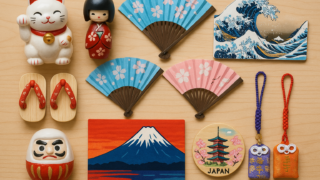- Introduction: Why Japanese Tea is the Perfect Souvenir from Japan
- The Best Japanese Tea Brands to Look For
- How to Choose the Best Japanese Tea for Souvenirs
- Where to Buy Authentic Japanese Tea in Japan
- How to Enjoy Your Japanese Tea at Home
- Conclusion: Bring a Taste of Japan Back Home
Introduction: Why Japanese Tea is the Perfect Souvenir from Japan
Imagine walking through the bustling streets of Japan, surrounded by vibrant culture, delicious street food, and the distinct scent of fresh greenery. But what if you could take a little bit of that Japan magic home with you? Well, here’s the secret: Japanese tea! Tea in Japan isn’t just a drink – it’s a way of life. From the zen-like tea ceremonies to the soothing moments in every Japanese home, tea plays a central role in the culture. It’s the perfect souvenir to remind you of the peaceful beauty of Japan long after you’ve left its shores. Plus, it’s compact, thoughtful, and a tasty reminder of your adventure.
Now, if you’re thinking, “How do I pick the best tea to bring home?” Well, you’re in for a treat! Let’s explore the best Japanese tea brands that will make your trip unforgettable and give you a taste of Japan to savor at home.
The Best Japanese Tea Brands to Look For
Japan is famous for its tea, but with so many options available, it can be tricky to know where to start. The good news? You don’t need to be a tea expert to find a gem. Whether you’re sipping in the morning or afternoon, there’s a Japanese tea for every occasion. Each tea variety has its own personality – think of it like meeting new friends at a party, each with a unique charm and flavor.
If you’re ready to take home the most delightful souvenirs, let’s dive into the best Japanese tea brands that will make you say, “That’s the one!” These teas aren’t just delicious, they’ll also offer a slice of authentic Japanese culture, and who doesn’t love a story with their tea?
1. Uji Matcha: The Crown Jewel of Japanese Tea
How Uji Matcha Became Famous Worldwide
If Japan’s tea world were a royal court, Uji matcha would undoubtedly wear the crown. Grown in Uji, Kyoto, the region known for its rich cultural history, Uji matcha has earned a reputation for being the best of the best. It’s like the Beyoncé of green tea – adored and respected all over the world.
Why all the fuss? Well, Uji matcha is a finely powdered green tea that’s made from the youngest, most tender leaves. The magic happens during the growing process: the tea plants are shaded for weeks before harvesting, giving the leaves a rich, deep flavor with a smooth, umami-packed taste. It’s like a mini spa treatment for your taste buds.
When you sip Uji matcha, it’s not just a drink – it’s an experience. You’re drinking centuries of tradition, culture, and expert craftsmanship in one cup. It’s so good that it’s almost like Japan’s best-kept secret – but now it’s yours to share with your friends back home!
2. Sencha: The Refreshing Taste of Japan’s Everyday Tea
The Different Varieties of Sencha
If Uji matcha is the queen, then sencha is the dependable best friend. It’s the tea that Japanese people drink daily, at home or at work, and it’s as common as a morning cup of coffee in other countries. Sencha has a refreshing, light taste that’s just as suited to a lazy afternoon as it is to an elegant meal.
Sencha is made from tea leaves that are quickly steamed to preserve their fresh, grassy flavor. The result? A vibrant green tea that is both invigorating and soothing – like a cool breeze on a warm day. There are many varieties of sencha, and they range from light and delicate to rich and robust. Think of it as a choose-your-own-adventure tea experience.
For a souvenir, sencha is an easy choice. It’s available all over Japan, from traditional tea shops to modern supermarkets, and its versatility means it can be enjoyed by everyone. It’s like the Swiss Army knife of Japanese tea – practical, reliable, and endlessly refreshing!
3. Gyokuro: The Premium Green Tea for Special Occasions
How Gyokuro is Grown and Harvested
When you think of gyokuro, picture yourself in a luxurious tea garden, surrounded by the best of the best. This is Japan’s top-tier green tea, and it’s reserved for those special moments – like sipping in the garden during the peak of cherry blossom season, or when you’re celebrating the completion of a long journey.
Gyokuro is produced by carefully shading the tea plants before harvesting, similar to matcha, but it takes it a step further. The leaves are delicately handpicked and steamed to preserve their rich, full-bodied flavor. The taste is more complex than sencha, offering a mellow sweetness and deep umami that lingers on the palate.
Because gyokuro is such a luxurious tea, it’s often gifted to loved ones for celebrations, making it an excellent souvenir choice for anyone who wants a truly extraordinary tea experience. It’s like the VIP pass to the world of Japanese tea.
4. Genmaicha: A Delightful Blend of Green Tea and Roasted Rice
The Unique Flavor Profile of Genmaicha
If gyokuro is the king of teas, then genmaicha is the fun, quirky cousin who knows how to entertain. This tea is a blend of green tea leaves (usually sencha) and roasted rice, which gives it a distinct, nutty flavor that’s both comforting and surprising. The roasted rice adds a toasty, savory twist, and the green tea offers a clean, grassy note. It’s like a warm hug for your taste buds – the perfect balance between rich and refreshing.
Genmaicha has a unique history: it was originally a tea for the common folk in Japan, as the addition of roasted rice made it more affordable. Today, it’s beloved by people of all walks of life, and it’s often enjoyed with meals or as a casual, laid-back drink.
If you’re looking for something a little different to take home, genmaicha is a fantastic choice. It’s like discovering a hidden treasure – a blend that’s both traditional and unexpectedly modern.
5. Hojicha: Roasted Green Tea with a Smoky Twist
Why Hojicha is Loved by Many Japanese Tea Drinkers
You’ve heard of green tea, but have you tried roasted green tea? Enter hojicha – Japan’s smoky, toasted wonder. If you’ve ever had a grilled marshmallow or roasted chestnut, you’ll get an idea of the flavor profile of hojicha. It’s earthy, warm, and slightly smoky – the perfect tea for cozy evenings or when you need a break from the more astringent green teas.
The magic of hojicha happens during the roasting process. The leaves are carefully roasted over high heat, which gives the tea its signature brownish color and unique taste. The result? A mellow, low-caffeine tea that’s perfect for winding down after a long day. It’s a comforting cup of warmth and nostalgia, wrapped in a mug.
In Japan, hojicha is loved by all ages, especially because of its mild flavor. If you’re looking for a tea that offers something a little different yet familiar, hojicha is your go-to. It’s like the comfort food of teas – simple, satisfying, and oh-so-delicious.
How to Choose the Best Japanese Tea for Souvenirs
Factors to Consider When Buying Japanese Tea
Tea Type vs. Personal Preference
Now that you know the best tea brands to buy, the next question is: how do you choose the right one for yourself or as a gift? It’s like picking the perfect souvenir – the key is finding something that suits your taste or the preferences of the person you’re gifting it to.
Start by considering the person’s taste. Are they a fan of bold, rich flavors or more delicate and light brews? Matcha and gyokuro are perfect for those who love complex, savory notes, while sencha and hojicha are lighter and more refreshing. If you’re shopping for someone who enjoys a more unique, comforting tea, try genmaicha.
Consider packaging as well! A beautifully packaged tea can make the gift feel extra special – it’s like adding a cherry on top of a sundae. Many Japanese teas come in elegant boxes or tins, which make them perfect for gifting to loved ones back home.
Packaging and Presentation: Making the Gift Extra Special
Beautiful Tea Packaging as a Part of Japanese Culture
When it comes to Japanese tea, the packaging is almost as important as the tea itself. In Japan, presentation is everything. Tea is often packaged in beautifully designed boxes, tins, or even traditional fabric-wrapped furoshiki, making it a delightful gift to bring home. It’s as much about the experience of unwrapping the gift as it is about enjoying the tea.
If you’re giving Japanese tea as a souvenir, make sure to look for tea that’s packaged in a way that reflects the culture and care that goes into its production. It’s like opening a small gift from Japan every time you sip. Some packaging designs feature traditional Japanese motifs, like cherry blossoms or cranes, while others use minimalist modern styles – no matter your taste, you’ll find something that feels uniquely Japanese.
A beautifully wrapped tea gift is the perfect way to bring a piece of Japan’s culture back home. It’s like carrying a little bit of the serene, meticulous spirit of Japan in your suitcase.
Where to Buy Authentic Japanese Tea in Japan
1. Tea Shops and Specialty Stores
If you’re looking to buy the best Japanese tea while in Japan, tea shops and specialty stores are the way to go. These shops are often run by tea experts who can guide you through the different varieties, ensuring you leave with the perfect tea for your tastes. Plus, shopping at these stores gives you the chance to try before you buy – many places will offer free tastings, so you can sip and sample the goods.
The best part? These tea shops often carry exclusive, high-quality blends that you won’t find anywhere else. It’s like stepping into a tea lover’s paradise. Whether you’re in the bustling city of Tokyo or the peaceful countryside of Uji, there’s a charming tea shop waiting to show you the very best Japan has to offer.
2. Online Stores and International Shipping
For those who want to enjoy the magic of Japanese tea without leaving home, don’t worry – you can easily find top-quality teas online. Many Japanese tea brands offer international shipping, so you can get your favorite tea delivered directly to your door. It’s like bringing a little slice of Japan back with you without leaving the comfort of your home.
The convenience of online shopping means you can browse a wide range of teas, from matcha to hojicha, with just a few clicks. Plus, many websites offer detailed descriptions and brewing tips, so you can ensure that you’re getting the best tea for your needs. It’s an easy way to continue your love affair with Japanese tea long after you’ve left the Land of the Rising Sun.
How to Enjoy Your Japanese Tea at Home
Brewing Tips for Different Types of Japanese Tea
Perfecting the Art of Brewing Matcha, Sencha, and More
Now that you’ve got your Japanese tea, it’s time to brew the perfect cup! Brewing Japanese tea is an art – it’s not just about boiling water and pouring it over leaves. Each tea has its own set of rules to ensure that it tastes just right.
For matcha, you’ll want to whisk it with a chasen (a bamboo whisk) in a bowl with hot water, creating a frothy, vibrant green drink. For sencha, steep the leaves in hot (but not boiling) water for about 1-2 minutes – too hot, and it will be bitter; too cold, and it’ll be too weak.
Hojicha, with its roasted flavor, is best brewed with slightly cooler water, and it’s the perfect tea to enjoy in the evening because of its low caffeine content. Experiment with the different types and find the perfect balance that suits your taste – it’s like a mini tea ceremony in your own home!
Conclusion: Bring a Taste of Japan Back Home
The Perfect Souvenir to Share with Family and Friends
In the end, Japanese tea isn’t just a drink – it’s an experience, a piece of culture, and the perfect souvenir to remind you of your time in Japan. Whether it’s the delicate bitterness of matcha or the toasty warmth of hojicha, each cup is a reminder of the beautiful landscapes, traditions, and people of Japan.
The best part? Japanese tea is easy to share. You can gift a beautifully packaged tea to a friend, or brew a pot for family gatherings, spreading the joy of Japan wherever you are. Every sip transports you back to those tranquil moments in Japan, making the memories last long after your trip ends. So, what are you waiting for? Start brewing!







コメント